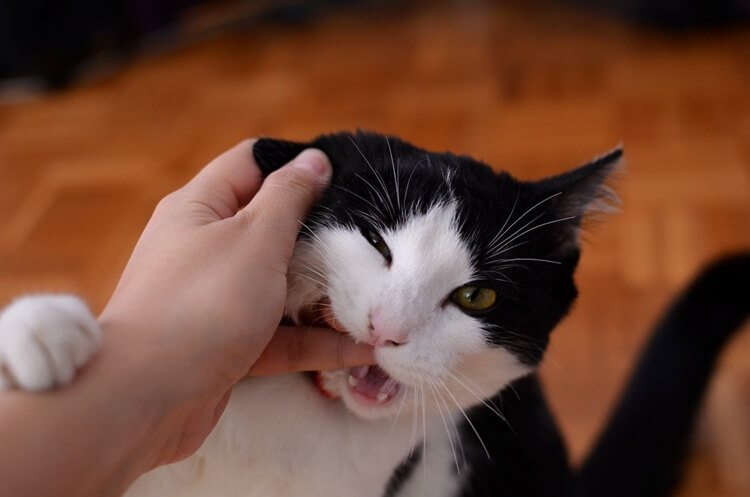Cats make wonderful companions, but with their unique personalities, they also require a different approach to care and healthy living than other pets. we provide helpful tips on how to keep your feline friend healthy and happy! From dietary needs to grooming habits and more, find out all you need to know here.

To the veterinary how often does your cat go? For National Cat Health Month, we’d like to stress the importance of routine preventative treatment, even if your cat seems fine.
Why do cats bite?
Cats typically bite to send signals or to get you to stop doing something. It’s critical to comprehend the messages your cat is trying to convey! When cats bite, they’re trying to let you know that they don’t like the attention they’re getting. There’s a narrow line between being delightful to handle and being infuriating to the pet felines.
Sudden cat biting when petting
The abrupt attitude shift that can happen during stroking, where a cat may one moment be adoring the attention and the next snap at your fingers, is one of the most prevalent complaints from cat owners.
Although it can be difficult to tell when a cat has had enough petting, learning to read your cat’s body language will help you anticipate potential bites.
Cat biting when playing
Cats frequently bite their owner as a way to demonstrate their innate hunting instinct.
Biting and “bunny-kicking” are normal ways for kittens to play. They do this with their littermates and mothers. It’s like how they jump on their prey, grab it, and bite it.
Aggressive cat biting
Cats often bite as a warning or when they are too excited to play, but it can sometimes be a sign of aggression. Biting during play is pretty easy to tell apart from biting out of aggression since these small bites don’t hurt much and are over quickly. When your cat bites you or another animal when it’s angry, it’s usually accompanied by other signs that it wants to fight.
When animals bite aggressively, they often hiss, spit, and stand in a defensive, arched position. Try to keep your pet away from situations that make them aggressive. This is more likely to happen when cats live outside and fight over their territory or when cats have been abused in the past and are easily scared.
It’s important to stop aggressive cats from biting. Your pet needs to learn that this kind of behavior isn’t okay, or they will keep doing it to show how scared or angry they are. Even if you teach a cat not to bite, it can sometimes forget what you taught it and act on instinct. Always give your pet treats when it does something good, and never try to punish it physically, because it won’t get the message.
How to stop your cat from biting you
You can help them get rid of this natural urge by giving them toys they can bite and claw to their hearts’ content. This will keep them from getting into your limbs. When your cat plays with their toys by biting and clawing them, show them love and give them a treat.
Kitten biting phase
Don’t worry if your kitten starts to bite and pounce on other animals and you when you play.
All cats spend a lot of time playing by fighting with each other. They do these things because it’s in their nature to do so. They are practicing for the day when they will have to hunt for their food, even though most indoor kittens will never have to do that. Even though this is a natural behavior that should be encouraged in young kittens, you should never let them think it’s okay to bite your fingers and toes.
Choose a veterinarian
Finding a neighborhood veterinarian you can trust and openly talk with is the first step in bringing a cat home. Once you’ve made your decision, get in touch with your cat’s vet to schedule vaccination appointments, ask essential questions, and obtain crucial advice on how to keep your cat happy and healthy.
What are the Cat Care Do’s & Don’ts
Having a cat requires careful consideration of several factors. In case you have a cat or you’re thinking about getting a cat, here are some good habits to develop and bad ones to avoid.
Do
- Every day, play with your cat. Daily play will do wonders for the health and quality of life of your cat, who needs cerebral stimulation. Teaching them to walk with a harness or providing them with controlled access to the outdoors through a “catio” (screened-in patio or other similar enclosed space) can also be helpful.
- Give your cat a post or pad to scratch on. Scratching posts let cats get exercise, stretch out their bodies to their full length, get rid of dead scales on their claws, and mark their territory. If you don’t give your cat a scratching post, it might scratch on your furniture instead.
Don’t
- Grab your grown-up cat by the scruff of the neck. This is how mother cats usually pick up their kittens, but an adult cat is too heavy, and it could hurt or hurt the cat. Instead, pick up your cat with both hands, one under the chest behind the front legs and the other under the abdomen, supporting her rump.
- If you’re not around, let your cat chew on a piece of string. If they eat it, it could get stuck in their intestines and make them sick.
- Don’t put screens on the windows your cat can use. They could jump out to chase a bird or something else exciting, but if they fell, they could seriously hurt themselves.
How to keep your cat healthy between trips to veterinary
Groom your cat regularly
Whether your cat has short or long fur, brushing or combing him often will help him a lot. This allows him to get rid of dead hair so he doesn’t eat it when he grooms himself. It also gives you a chance to see if his body has changed in any way. Your vet can then immediately check out any strange things, like lumps, bumps, or sore spots.
Provide fresh water daily
Clean, fresh water is essential for the health of your cat. If your cat doesn’t drink from a bowl, try giving her a tall glass or a cat fountain. Make sure to fill up the water every day with fresh water.
Make sure you have enough litter boxes
As a rule of thumb, there should be one litter box for every cat plus one more. If you have two cats, that means you need three litter boxes. Keep the litter boxes clean to get cats to use them well. This could mean that you have to scoop more than once a day. Regular cleaning will also let you know if your cat’s urine or feces change, which could be a sign of a health problem.
Notice if your cat starts to urinate outside of its litter box
If the litter box is dirty, a cat may urinate outside of it. But before you blame the accident on your cat’s bad behavior or the dirty litter box, you should make an appointment with the vet. If a cat changes how they use the litter box, it could be because they have an infection in its urinary tract or another health problem.
Train your cat to use a scratching post
This will keep your cat from scratching up your furniture and will also help her stretch her muscles and keep her claws in good shape. When your cat scratches on a suitable surface, like carpet, sisal, or cardboard, it gets rid of the old nail layers.
Use a cat carrier in the car
Do you need to take your cat to the vet? Maybe you’re relocating to a new house? Use a pet-specific carrier while transporting your cat. If you let your cat wander free in the automobile, you might become distracted and endanger both you and your cat in accidents.
Keep your cat’s teeth clean
Cats can get tartar on their teeth, causing gum disease and tooth rot. Bacteria on your cat’s teeth can enter her bloodstream and cause sickness. Cats can’t brush, unlike humans. Many cats won’t let humans wash their teeth. At least once a year, have your vet clean your cat’s teeth.
Schedule regular veterinary visits
The cat’s teeth are cleaned, vaccinations are given, and the vet has the opportunity to diagnose and treat any potential ailments that could affect cats at an earlier stage during annual checkups. Your veterinarian will also be able to tell you whether or not your cat has reached a healthy weight.
The Fundamentals of Cat Care
You’ll need to understand the fundamentals of cat care if you bring a new kitten or adult cat home. Everything is necessary, from food and litter to veterinarian treatment and grooming.
Having a cat that constantly bites you is a major nuisance. Find out the causes of cat biting and effective solutions in a comprehensive guide and advice.
Cats have a reputation for being vicious. A cat’s quick, seemingly unprovoked, biting might have several causes. When a cat bites, it’s not always a mean thing.
Because of their predatory nature, cats often engage in seemingly hostile behaviors during play. This includes biting, pouncing, and scratching. There is a narrow line between stimulating play and enabling violent behavior in cats, so it’s crucial to enable and encourage this natural tendency.
To prevent unwanted biting, it can be helpful to get an understanding of the circumstances in which cats bite.
Conclusion
Cats are amazing companions and it’s important to provide your cat with the best possible care so they can enjoy a long and healthy life. With the right knowledge, you can understand how to create an environment that supports your cat in feeling safe, happy, and healthy. We hope these tips have given you helpful ideas on how to take excellent care of your furry friend. From regular veterinary checkups, proper grooming habits, and the right nutrition to sufficient exercise opportunities and plenty of playtimes, offering the best care for your pet is essential in keeping them contented.



